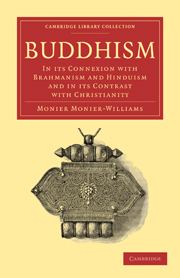Book contents
- Frontmatter
- Preface
- Postscript on the common error in regard to the comparative prevalence of Buddhism in the world
- Contents
- List of Illustrations
- Rules for Pronunciation
- Pronunciation of Buddha, etc. Addenda and Corrigenda
- LECTURE I INTRODUCTORY OBSERVATIONS
- LECTURE II THE BUDDHA AS A PERSONAL TEACHER
- LECTURE III THE DHARMA OR LAW AND SCRIPTURES OF BUDDHISM
- LECTURE IV THE SAṄGHA OR BUDDHIST ORDER OF MONKS
- LECTURE V THE PHILOSOPHICAL DOCTRINES OF BUDDHISM
- LECTURE VI THE MORALITY OF BUDDHISM AND ITS CHIEF AIM—ARHATSHIP OR NIRVĀṆA
- LECTURE VII CHANGES IN BUDDHISM AND ITS DISAPPEARANCE FROM INDIA
- LECTURE VIII RISE OF THEISTIC AND POLYTHEISTIC BUDDHISM
- LECTURE IX THEISTIC AND POLYTHEISTIC BUDDHISM
- LECTURE X MYSTRICAL BUDDHISM IN ITS CONNEXION WITH THE YOGA PHILOSOPHY
- LECTURE XI HIERARCHICAL BUDDHISM, ESPECIALLY AS DEVELOPED IN TIRET AND MONGOLIA
- LECTURE XII CEREMONIAL AND RITUALISTIC BUDDHISM
- LECTURE XIII FESTIVALS, DOMESTIC RITES, AND FORMULARIES OF PRAYERS
- LECTURE XIV SACRED PLACES
- LECTURE XV MONASTERIES AND TEMPLES
- LECTURE XVI IMAGES AND IDOLS
- LECTURE XVII SACRED OBJECTS
- SUPPLEMENTARY REMARKS ON THE CONNEXION OF BUDDHISM WITH JAINISM
- LECTURE XVIII BUDDHISM CONTRASTED WITH CHRISTIANITY
- OBSERVE
- Plate section
LECTURE V - THE PHILOSOPHICAL DOCTRINES OF BUDDHISM
Published online by Cambridge University Press: 29 August 2010
- Frontmatter
- Preface
- Postscript on the common error in regard to the comparative prevalence of Buddhism in the world
- Contents
- List of Illustrations
- Rules for Pronunciation
- Pronunciation of Buddha, etc. Addenda and Corrigenda
- LECTURE I INTRODUCTORY OBSERVATIONS
- LECTURE II THE BUDDHA AS A PERSONAL TEACHER
- LECTURE III THE DHARMA OR LAW AND SCRIPTURES OF BUDDHISM
- LECTURE IV THE SAṄGHA OR BUDDHIST ORDER OF MONKS
- LECTURE V THE PHILOSOPHICAL DOCTRINES OF BUDDHISM
- LECTURE VI THE MORALITY OF BUDDHISM AND ITS CHIEF AIM—ARHATSHIP OR NIRVĀṆA
- LECTURE VII CHANGES IN BUDDHISM AND ITS DISAPPEARANCE FROM INDIA
- LECTURE VIII RISE OF THEISTIC AND POLYTHEISTIC BUDDHISM
- LECTURE IX THEISTIC AND POLYTHEISTIC BUDDHISM
- LECTURE X MYSTRICAL BUDDHISM IN ITS CONNEXION WITH THE YOGA PHILOSOPHY
- LECTURE XI HIERARCHICAL BUDDHISM, ESPECIALLY AS DEVELOPED IN TIRET AND MONGOLIA
- LECTURE XII CEREMONIAL AND RITUALISTIC BUDDHISM
- LECTURE XIII FESTIVALS, DOMESTIC RITES, AND FORMULARIES OF PRAYERS
- LECTURE XIV SACRED PLACES
- LECTURE XV MONASTERIES AND TEMPLES
- LECTURE XVI IMAGES AND IDOLS
- LECTURE XVII SACRED OBJECTS
- SUPPLEMENTARY REMARKS ON THE CONNEXION OF BUDDHISM WITH JAINISM
- LECTURE XVIII BUDDHISM CONTRASTED WITH CHRISTIANITY
- OBSERVE
- Plate section
Summary
One of the most noteworthy points in the early history of Buddhistic thought is that while Gautama Buddha denied the existence of Brahmā as a personal Creator and repudiated the Veda and all Vedic sacrifices and ceremonial observances, he at the same time made the philosophical teaching of the Brāhmans the point of departure for his own peculiar philosophical teaching.
Another noteworthy point is that while Buddhism was undoubtedly a modification of philosophical Brāhmanism, the latter was also modified by an interchange with Buddhistic ideas.
It may certainly be questioned whether Gautama himself, in the early stages of his career, ever caused much offence to the most orthodox Brāhmans by the free expression of his opinions. He did not spare either his criticism or sarcasm, but it is well known that the Brāhmans were not only tolerant of criticism; they were equally critical themselves, and delighted in controversial discussions, as they do to this day.
In the Tevijja-Sutta an account is given of a discussion in which, though Gautama expressed himself strongly, he does not seem to have excited any wrath in his opponent—a Brāhman named Vāsettha.
The argument attributed to the Buddha is so remarkable that a portion of it may be given here:—
‘Then you say, Vāsettha, that not one of the Brāhmans, or of their teachers, or of their pupils, even up to the seventh generation, has ever seen Brahman (the God of the Brāhmans) face to face.
- Type
- Chapter
- Information
- BuddhismIn its Connexion with Brahmanism and Hinduism and in its Contrast with Christianity, pp. 93 - 122Publisher: Cambridge University PressPrint publication year: 2010First published in: 1889



